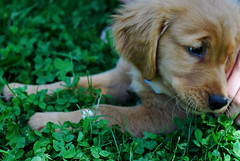 |
| Puppy in the grass (Photo credit: justmakeit) |
If you're reading this article, then you are wanting to train your
puppy and learn all you can on how to do so. This article can help you learn
all kinds of things to train a show puppy properly.
Always reprimand
bad behaviors. Be very firm when you say no to your puppy. Do not holler and do
not hit the puppy with your hand or anything else. This will teach your puppy
more bad behavior. Puppies do not remember things for too long. If you wait too
long, the puppy won't understand what you're trying to tell it.
When teaching a puppy
to fetch, make sure to establish your role as the leader by having him/her
bring the ball directly to you each time. He must bring it directly to you, not
nearby. If he drops it at a distance from you, he is challenging your
authority. Instilling the idea of the puppy bringing the ball helps it
understand what it should be doing while fetching.
Make sure your puppy
gets plenty of exercise in addition to scheduled training and potty break
sessions. A puppy that is physically active and has the chance to exercise
regularly is more capable of learning during training sessions. Keep in mind
that a puppy that's been exercised regularly is happier and more responsive to
your commands.
Training your puppy
requires you to be firm and authoritative. However, you should avoid being too
loud or aggressively reprimanding your puppy as this will hurt your
relationship. Your goal should be to show that you are both strict and
forgiving. This will help improve the relationship between you and your puppy.
Don't allow your puppy
to drag you around. You should always be leading the way, not vice-versa. Use a
secure collar with a short leash when beginning obedience training. Teach your puppy
to heel when walking, and always pass through gates and doors ahead of him.
Keep in mind that you are in charge!
Make sure you are
aware of any signs your puppy shows you that he or she is uncomfortable with
something. Do not force your puppy if he is showing signs of being
uncomfortable when he meets new animals or people. Your puppy is making you
aware that it is uncomfortable and it's important that you honor that. Pushing
your puppy could cause it to bite other humans or animals.
Keep a spray
bottle handy to deter your puppy when it tries to bite people or things. This
helps show him that you will not tolerate certain behaviors. As your puppy
learns the behavior is unwanted, he will begin to avoid doing the bad behavior.
Timing is crucial
when you train a puppy, so you need to spend an adequate amount of time
training them, but not too much. Start out training for just a few minutes each
day and work up to half an hour or so over time. Observe when your puppy starts
to stop paying attention during the session.
Does your puppy
have all of the nutrition it needs. If your puppy is not eating the right kind
of diet, they might become inattentive, hyperactive or even sick. Find out what
your puppy's breed needs in terms of nutrition and then meet those needs. Your
vet is an excellent source of information on the appropriate diet and
nutritional requirements of your puppy.
Training your puppy
to start rolling over is easy, but be sure to have some treats. The puppy has
to lay down first. Then, use the treat to draw his head from one side to the
other. His nose will track that treat and his body will roll over. Say
"roll over" as he performs the action so that he'll learn the
command. Never become frustrated if it does not happen right away. Once he does
learn how, he will be a celebrity among other puppies.
It is important to
have an appropriately sized puppy crate. Don't forget, your puppy will grow.
Choose a crate that works both for puppy and mature sizes. There should be
ample room for the puppy to lie down and turn comfortably.
Pay attention to
the puppy's signs so that accidents indoors do not occur. Sometimes, a pattern
will develop that you will want to get rid of. When you know what to look for,
you'll avoid all accidents. House training is simpler when you make yourself
aware of the natural tendencies of your puppy.
Use control when
rewarding good behavior during puppy training. When the puppy correctly follows
your commands, you can certainly give a reward. Even though your accomplishment
might thrill you, they reflect your energy. Do not lose control of any
situation with contagious excitement and enthusiasm. You should stay calm and
then give the reward.
In conclusion, it
should be very important for your show puppy to be successful. The advice this
article has provided you with is proven to help train a puppy. While not every
method works for every owner or puppy, hopefully these tips will enable you to
train your puppy correctly.

No comments:
Post a Comment